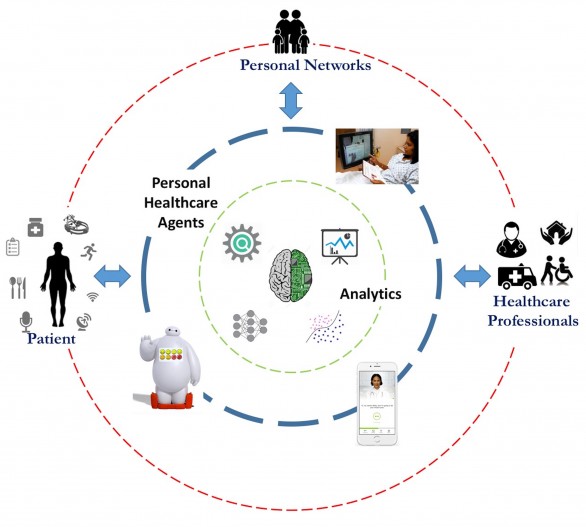Personal Healthcare Agents (PHA)
“Agent” is an overloaded term in the computer science and artificial intelligence domain.
More recently researchers and practitioners have become acquainted to interact with digital agents, to speak natural language and have relatively simple tasks executed. Such agents can retrieve contacts, set alarms, provide driving directions to your work location and occasionally surprise with funny jokes. This current state-of the-art has been a tremendous achievement following decades of research in the past 50 years [Riccardi , 2014].
Personal Healthcare Agents (PHA) will change people’s lives and revolutionize the way they manage their wellbeing and health. They will be able to sense the environment , the personal and social behavior , as well as the human organ systems. They will be elaborating, interpreting, summarizing and making sense of these signals and share it with you as well as your caregivers. They will be playing a key role in providing evidence for personalized therapies and in the doctors’ decision-making processes. PHAs will be supporting and motivating people to stir their habits towards healthy lifestyles. PHAs will be engaging patients to behave according to doctors’ recommendations and prescriptions. PHAs may be granted the mission to communicate amongst themselves to share information and make sense of information and trends within demographic groups across geographical and urban areas at different scales.
It will take at least 50 years . It will need new technology and research, change in people’s habits, disruption in doctors and health professionals protocols, innovation in healthcare services and education of next-generation doctors, engineers and professionals.
Let the research and technology journey begin.
PHA To Benefit Humanity
Global increase and incidence of chronic conditions ( hypertension, diabetes, heart failures) and mental disorders among others has created new challenges for healthcare systems and people in all age brackets ( from teenagers to ageing workers and to elderly people ).
The goal of our research is to develop core algorithms and technologies for intelligent agents interacting with different types of users: patients and individuals and healthcare professionals. These intelligent agents will be able to combine, extract knowledge, and learn from natural language in the spoken, textual and multimodal form and covert signals (e.g. heart rate, electrodermal activity) generated by the patients with world signals (traffic, weather, clinical, genomic, social, etc) which can be obtained through various sensors and media channels. PHA will support individuals and patients as well to improve their healthy habits or help their behavior adhere to therapies and adjust to their expected optimal behavior.
To benefit humanity we need to design pathways for our algorithms ( machine learning, artificial intelligence and conversational AI ) to be developed and tested in our laboratory. Following this phase we connect with our collaborators in the industry and end-users to co-design and co-develop the technology and process instances to be tested in real settings.
Riccardi G., “Towards Healthcare Personal Agents”, ACM International Conference on Multimodal Interaction, Workshop on Roadmapping the Future of Multimodal Interaction Research including Business Opportuinities and Challenges, Istanbul 2014.
PHA for Hypertension
Danieli M., Ghosh A., Berra E., Fulcheri C., Rabbia F., Testa E., Veglio F., Riccardi G., “Automatically classifying essential arterial hypertension from physiological and daily life stress responses.” ESH 2016 – The 26th European Meeting on Hypertension and Cardiovascular Protection, Paris, France, June 10 -13 2016.
Ghosh A, Danieli M. and Riccardi G., “Detection of Essential Hypertension with Physiological Signals from Wearable Devices”, IEEE Conf. Engineering in Biology and Medicine Society, Milan, 2015.
Ghosh A., Danieli M., Riccardi G., “Annotation and Prediction of Stress and Workload from Physiological and Inertial Signals.” Engineering in Medicine and Biology Society (EMBC), 2015 37th Annual International Conference of the IEEE.
PHA for Autism
Torres M. J., Clarkson T., Hauschild K., Luhmann C. C., Lerner D. M. and Riccardi G., “Facial emotions are accurately encoded in the brains of those with autism: A deep learning approach”, Biological Psychiatry: Cognitive Neuroscience and Neuroimaging, 2021 .
Torres M. J., Ravanelli M., Medina-Devilliers S., Lerner D. M. and Riccardi G., “ Interpretable SincNet-based Deep Learning for Emotion Recognition in Individuals with Autism, ” IEEE Conf. Engineering in Medicine and Biology, Conference, 2021.
Mayor Torres, J.M., Libsack, E.J., Clarkson, T., Keifer, C.M., Riccardi, G., Lerner, M.D., “EEG-based Single trial Classification Emotion Recognition: A Comparative Analysis in Individuals with and without Autism Spectrum Disorder ” Annual Meeting of the International Society for Autism Research, Rotterdam, 2018.
PHA for Mental Health
Danieli M., Ciulli T, Mousavi M. and Riccardi G., “A Participatory Design of Conversational Artificial Intelligence Agents for Mental Healthcare”, JMIR Formative Research Journal, Vol. 5, No 12, 2021 .
Mousavi M., Cervone A., Danieli M. and Riccardi G., “ Would you like to tell me more? Generating a corpus of psychotherapy dialogues ” NAACL, Workshop on NLP for Medical Conversations, 2021.
Tortoreto G., Stepanov E. A., Cervone A., Dubiel M., Riccardi G., “ Affective Behaviour Analysis of On-line User Interactions: Are On-line Support Groups more Therapeutic than Twitter? ” Association for Computational Linguistics Conference, Workshop on Social Media Mining for Health Applications, Florence, 2019.
Stepanov E. A., Lathuilierev S., Chowdhury S. A., Ghosh A., Vieriu R.D., Sebe N. and Riccardi G., “ Depression Severity Estimation from Multiple Modalities ” IEEE 20th International Conference on e-Health Networking, Applications and Services (Healthcom), Ostrava, 2018. EXCELLENT Paper AWARD
Ghosh A., Stepanov E. A., Danieli M., and Riccardi G., “Are You Stressed? Detecting High Stress from User Diaries”, Proc. IEEE International Conference on Cognitive Infocommunications, Debrecen, 2017.

